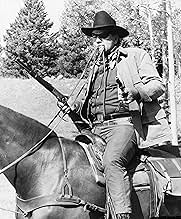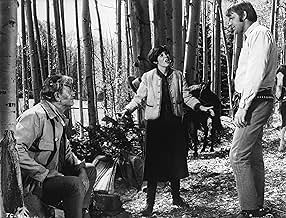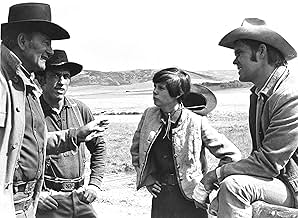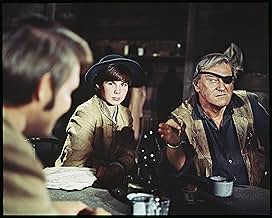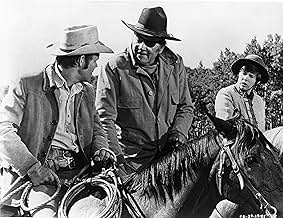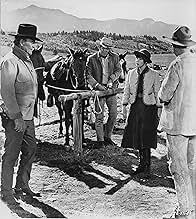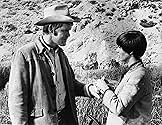Un terco mariscal de Estados Unidos con un problema con el alcohol y un guarda forestal de Texas ayudan a una testaruda adolescente a encontrar al asesino de su padre en territorio indio.Un terco mariscal de Estados Unidos con un problema con el alcohol y un guarda forestal de Texas ayudan a una testaruda adolescente a encontrar al asesino de su padre en territorio indio.Un terco mariscal de Estados Unidos con un problema con el alcohol y un guarda forestal de Texas ayudan a una testaruda adolescente a encontrar al asesino de su padre en territorio indio.
- Dirección
- Guionistas
- Elenco
- Ganó 1 premio Óscar
- 6 premios ganados y 7 nominaciones en total
- Dirección
- Guionistas
- Todo el elenco y el equipo
- Producción, taquilla y más en IMDbPro
Opiniones destacadas
John Wayne's parting comment in this film is directed as much at us the viewers as it is at the young woman his Rooster Cogburn character is addressing. In a way, Wayne throughout the film plays off the image he cemented in dozens of great and near-great westerns, with a nod that by 1969, he along with the western genre had fallen behind the times, that his shoot-first approach to law and order had worn thin with the critical establishment just as it does in Judge Parker's courtroom.
In that way, playing a character of such dogged homicidal cussedness as the hard-drinking, one-eyed ex-Quantrill Raider Rooster Cogburn and giving him a teenaged girl seeking justice to play off so as to showcase his essential decency seems a clever means to win Wayne an Oscar, which he finally did here, a sentimental triumph over some more heralded performances. With such an attitude, you might think "True Grit" would come off a bit of a one-trick pony 37 years on. But it doesn't. In many ways, both the film and Wayne's performance come off better than ever.
Helping matters a lot is the support Wayne receives from two women. As the heroine, Matty Ross, Kim Darby provides Wayne with a fantastic foil, doughty to the point of rudeness, forever finding fault in others but earning your good will through her simple faith in justice and loyalty to the memory of her slain father, for whom she wants Rooster's help avenging. As she is told by a horse dealer she banters with: "I admire your sand."
The other is Marguerite Roberts, whose adaptation of Charles Portis' novel bristles with good humor and an ear for the period. "If ever I meet one of you Texas waddies who ain't drunk water from a hoofprint, I think I'll... I'll shake their hand or buy 'em a Daniel Webster cee-gar," Rooster tells his braggart riding companion, a young Texas Ranger played by country singer and ex-Beach Boy Glen Campbell.
Campbell may be a novice and a third wheel in the interplay between Wayne and Darby, but he acquits himself well and delivers a worthy performance in a cast stacked with talented actors like Robert Duvall, Jeremy Slate, and Strother Martin, not to mention Dennis Hopper, hiding the long hair he made famous in "Easy Rider" that same year. Some of these actors portray bad guys, but Roberts' script and director Henry Hathaway's languid pacing allow them to present some humanizing qualities that go a long way toward making "True Grit" more than your typical shoot-em-up oater.
Even Jeff Corey, who plays a no-account named Chaney who shot Matty's father, has a funny scene when he tells Matty how to cock her pistol, then whines after she shoots him with it: "Everything happens to me!"
About the only fault I can find with the film is Elmer Bernstein's bombastic score, which employs overly ornate orchestration like kettledrums when Matty has her showdown with Chaney and is tuneless apart from the title song, which is Campbell's best moment here. Hathaway's direction is somewhat pedestrian but serves the script, and showcases some incredible autumnal vistas of tall birch and pine where Rooster and Matty search for Chaney, photographed by Lucien Ballard in a style akin to (but more dreamy than) his work on the same year's "The Wild Bunch."
1969 was the last great year for westerns, with this, "The Wild Bunch," "Butch Cassidy And The Sundance Kid," "Support Your Local Sheriff" and "Once Upon A Time In the West," and its interesting how Ballard, Corey, and Strother Martin turned up in more than one of them. But good westerns never really go out of style, they just sit on the shelf awhile like an old Stetson waiting to be rediscovered. Nobody wore a Stetson better, or deserved an Oscar more, than John Wayne. "True Grit" does the double duty of showing why he was a star and further burnishing his luster.
In movies, the desire to please as wide an audience as possible seems always to win out, effectively robbing most westerns of the motion picture's essential gambit; the suspension of disbelief. It's very hard to lose oneself in a tale of the late 1800's when the female lead's eye-liner and coiff are pure 1950. Or 1940, 1960, whatever. In True Grit, very little of 1969 is allowed to intrude on this rather simple tale of justice and revenge. This movie is anchored by two very strong themes, shared by all the actors, across most of the scenes.
The first, is language. The dialogue is an absolute delight. Crack open anything by Mark Twain, Henry James or any other late 19th century author, and you will see that people really did speak differently 150 years ago. That the dialogue in 99% of westerns is straight from the time of their filming is a travesty, at best.
Second, is innocence. Not that of any one character however, but the innocence of the human race as a whole. It is probably almost impossible for any of us now, in this day and age, to truly imagine what it must have been like to live back when. But one thing's sure, people were much more naive. There was no such thing as mass-communication, a good percentage of the population didn't read, and newspapers, the only "organized" form of news at the time, were hard pressed to report on anything more than a day's ride from town.
This basic, shared innocence is achingly portrayed by Robert Duvall in two short sentences near the end of the movie when he's caught Mattie and he's attempting to threaten her. Study those two lines, and you'll see that "Lucky" Ned Pepper, the worst villain in the story, really has no idea of what he could possibly do to a slip of a girl. He's totally at a loss. The unspeakable, modern-day atrocities we consume every day with our coffee and bagels are so far from contemplation by Duvall's character, that all he can do is assure her, "I'll do what I have to". It's a priceless moment - frighteningly accurate commentary wrapped in two lines of simple dialogue, delivered with dead-on interpretation.
The only other western I can think of at the moment that delivers with such viscerally historic accuracy is "Unforgiven".
MjM
However, the film does look great. Handsomely shot with great scenery, True Grit is pleasing to the eye. Elmer Bernstein's score is rousing and very fitting, while the story is interesting, most of the characters are credible and the script flows well. Also True Grit is very well directed, and there is a glorious final shoot-out. Other than Campbell and Darby, the other acting is fine. While I would have not personally given the Oscar to this particular performance(I thought he was better in The Searchers, Red River and The Quiet Man) John Wayne is excellent here, and while he doesn't appear until quite later on Robert Duvall also makes a positive impression.
All in all, a very good film but could have been better in my view. 7/10 Bethany Cox
A tough man on a tough hunt for a gang of toughs - it's John Wayne's film all the way, with this he passed into his last phase in the saddle with a continuous wink at the cowboy parody he had become and which no-one else will ever match. By now after 40 years he was an American legend, your giant avuncular instant-lawman starring in his next horse opera - True Grit would really be nothing special without him, with the fat old man it's a nice Western comedy. We in the audience knew he had Grit before he came on, Kim Darby was just too slow on the uptake. I never understood why the script was so uncharitable to the Texican horse-killing son of a bitch Campbell, he's belittled right up to the scenes in Mattie's family graveyard.
Overall a shot in the arm (or leg!) if seen every few years - even in 1969 entertaining action films could still be made!
¿Sabías que…?
- TriviaStunt double Jim Burk performed the entire scene where Rooster Cogburn charged Ned Pepper's gang on horseback. John Wayne was only seen briefly in close-up, and he was riding on a trailer, not a horse.
- ErroresRooster reports Lucky Ned Pepper had robbed the KATY Flyer, a train that did not start running until 1896, long after the time in which the story is set.
- Citas
[Rooster confronts the four outlaws across the field]
Ned Pepper: What's your intention? Do you think one on four is a dogfall?
Rooster Cogburn: I mean to kill you in one minute, Ned. Or see you hanged in Fort Smith at Judge Parker's convenience. Which'll it be?
Ned Pepper: I call that bold talk for a one-eyed fat man.
Rooster Cogburn: Fill your hand, you son of a bitch!
- Versiones alternativasWhen submitted for a rating from the MPAA in 1969, the film was given an "M". The film was edited and rerated "G". The American VHS version contains the "G" rated cut while the DVD is the uncut "M" version (which would be printed as "PG" since the symbol was changed in the 1970s).
- ConexionesEdited into The Kid Stays in the Picture (2002)
Selecciones populares
- How long is True Grit?Con tecnología de Alexa
Detalles
- Fecha de lanzamiento
- País de origen
- Sitio oficial
- Idioma
- También se conoce como
- True Grit
- Locaciones de filmación
- Productora
- Ver más créditos de la compañía en IMDbPro
Taquilla
- Total en EE. UU. y Canadá
- USD 276,418
- Fin de semana de estreno en EE. UU. y Canadá
- USD 157,788
- 5 may 2019
- Total a nivel mundial
- USD 276,418


